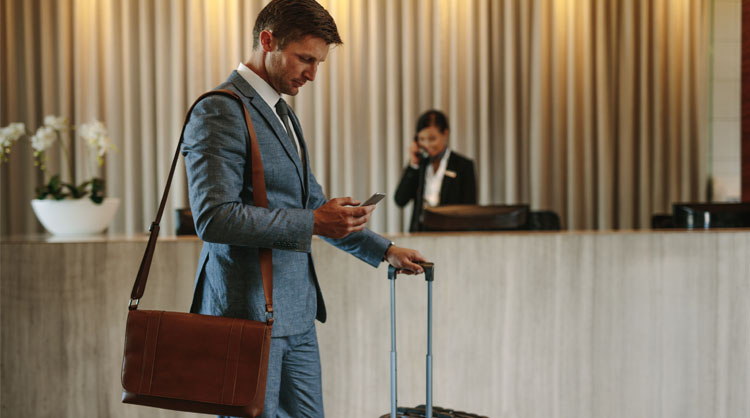Upskilled's 13 business travel tips

Where do you go when you're looking for some unique business travel tips? Whether you’re about to embark on your first business trip or you travel for work quite regularly, this list of business travel dos and don’ts is designed to take the stress out of preparing for your trip. It’s not just a packing list, but a guide to making the most of your trip, in comfort and in style.
Business travel tips and tricks
- Do your research.
- Print business cards.
- Check IT compatibility.
- Use your carry-on as a mobile office.
- Travel smart.
- Take care of yourself.
- Be strategic about the hotel.
- Utilise the business centre and executive lounge.
- Trust the concierge.
- Be a respectable representative.
- Keep your receipts.
- Don’t get caught without cash.
- Follow up on new acquaintances.
1. Do your research.
A business trip is an investment in your work and it’s important that you capitalise on the opportunity if it is presented to you. If this trip is a success it’s likely you’ll be offered more business trips in the future. To begin with, figure out who will be there, what the agenda is, which meetings or presentations you should prioritise and what your objectives are for the trip.
Check in with your boss or supervisor before you go to ask about your limits – what can you sign off on and what information needs to be relayed directly back to HQ? This way you can work towards specific outcomes from the trip.
2. Print business cards.

It’s really easy to get business cards printed affordably and there are many free templates online. You may only hand out a few, but they’re worth their weight in gold when you need them and far more professional than hand writing your email address on a serviette which will most likely get lost or forgotten. Remember though, that you must enter a country with the correct visa.
If you are travelling for a holiday, then a holiday visa is what you need; however, if you plan to look for work, you might need a working visa. Even travelling with business cards or a resume in your luggage can indicate to customs that you intend to work. Make sure you get the correct advice from your embassy before embarking on your travels.
3. Check IT compatibility.
If you’re giving a presentation get in contact with the venue or event coordinator ahead of time to enquire about the IT set-up. There’s nothing more embarrassing than arriving on the day and finding out your presentation won’t load. Save your presentation in a variety of formats, back it up digitally and carry a hard copy on a USB to save any headaches on the day.
4. Use your carry-on as a mobile office.
When travelling on business the worst scenario possible is that your luggage gets lost so, according to business school graduate and start-up founder Korbinnian Weisser, you should try to avoid checking a bag. If you do check luggage the bare essentials required to attend meetings or conduct your work must travel in your carry-on. This includes: a clean, work appropriate outfit; toiletries and cosmetics; your laptop, charging cords, a power bank and copies of all important documents.
5. Travel smart.
Allow plenty of time to get to and from the airport and work-related events. Missing flights are not an option and arriving late to meetings reflects poorly on your workplace. Remember that T.S. Elliot said, "We shall not cease from exploration, and the end of all our exploring will be to arrive where we started and know the place for the first time." Make sure you get where you're going, and leave yourself enough time for mistakes!
6. Take care of yourself.
Be it by plane, train or automobile, when you arrive at your destination you need to hit the ground running. There is very little time to get over jet lag or learn your surroundings.
In transit do your best to get proper sleep by packing an eye mask, ear buds or noise cancelling headphones. Melatonin—a hormone that is naturally released by the human pineal gland—can also be taken as a supplement. It is highly effective in correcting sleep patterns, according to Dr Alon Avidan, director of the UCLA Sleep Disorders Centre. If you struggle with jet lag, check with your GP before your trip to find out whether you should pack some.
Drink a lot of water, even if this means a few disruptions to your sleep. It will serve you in the long run. It’s hard to avoid the bugs that travel on planes, but use hand sanitiser regularly to avoid catching a head cold or worse.
7. Be strategic about the hotel.

Ensure that the hotel is in a convenient location, close to where you need to be in the mornings to avoid running late or missing out on precious shut eye. If possible, choose accommodation that has facilities for business people, even if it means paying slightly more. This brings us to our next point…
8. Utilise the business centre and executive lounge.
Many hotels have resources for guests conducting business, just like yourself. This may include a business centre and executive lounge, the business traveller’s ‘home away from home’ says Chris Chamberlin of Australian Business Traveller. The business centre will have some office equipment, printers, good internet connection and so forth.
The executive lounge is a good place to conduct meetings, often including complimentary snacks and beverages. Rather than hosting meetings in bars or restaurants, this is a far more professional space where productive work may be conducted.
9. Trust the concierge.
If you’re in a new city and you don’t have time to scroll the internet to find a good place to eat or catch up for a drink, ask the concierge. Explain what kind of venue you’re looking for and the concierge will be able to point you in the right direction, saving you time and energy that will be better spent elsewhere.
10. Be a respectable representative.
After a hard day of work you may be invited out to dinner and drinks by colleagues or new business associates. These social occasions are important networking opportunities and where possible it is polite to accept these invitations. However, even if they are hosted in a casual setting you must remember that as long as you are on this trip you are representing not just yourself but your employer. Drink moderately and behave respectfully. You can let off steam when you’re back home.
11. Keep your receipts.
Many of your trip’s expenses will be covered by your workplace but is it imperative that you keep all your receipts and, where relevant, pay with the company credit card.
12. Don’t get caught without cash.
Sometimes, inexplicably, your card won’t be accepted at certain international retailers and restaurants. It helps to have a few different bank cards you can pay for things with, as well as an adequate amount of physical currency on-hand.
13. Follow up on new acquaintances.
You will probably have made several new acquaintances from your trip. If you exchanged business cards or contact details, follow up with an email to thank them for the perspective or time they gave you. This is a quick and painless activity that many people neglect. By consolidating these new friendships you may secure yourself future employment, opportunities or invitations to conferences. You never know when these networks will come in handy, so follow up and don’t delay.
Business trips can sometimes turn out chaotic or overwhelming, but with the right planning and organisational skills - they don't have to be! Enjoy the experience and make the most of them by not only packing smart, but by knowing how to navigate your way around your destination and establish fruitful social connections. The right mindset should bring about a memorable occasion, where new friendships are made and career opportunities emerge.
Love travel?
Have you considered making it your career? Upskilled offers a short course in Business meetings and travel. You'll learn the essential skills in organising meetings and organising business travel for a range of clients and organisations. You can also do this course wholly online, while you work, or continue with your other projects. Head to the Business meetings and travel course page to find out more details.


)
)

